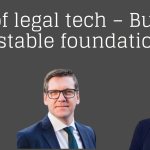In this webinar with Legl, we heard from Crispin Passmore, a legal management consultant and former executive director of the Solicitors Regulation Authority; Matt Jared, Legl’s CTO; and Legl’s own founder and CEO Julia Salasky about their experiences so far of working with large language models and advising clients on their roadmap.
Legl is a UK-headquartered client payments and compliance software provider that is leveraging OpenAI technology to help search and analyse thousands of data sources for compliance flags in its product CDD Assist. Legl estimates that it is saving clients around 10-15% of their time in client due diligence checks.
Speaking during the webinar, Jared said that one of the challenges of starting to play with LLMs is that they are able to do a lot out of the box, and are knowledgeable about a lot of topics, with Jared observing: “It’s really tempting to start with a really broad problem. One of our early learnings was starting big and then breaking that down into ‘what are the specific hypotheses and experiments we can run as to how we can use large language models to solve this problem.’
“We did a lot of brainstorming around our product and law firm processes and came out with a long set of hypotheses as to where we could start. We then had to break it down into small pieces for experimentation and what we found challenging is what does success and failure look like? Through testing and refining and hitting roadblocks and learning about new techniques to get the responses we were looking for we made progress.”
The age-old debate over whether law firms ought to be building their own generative AI capability or relying on business partners came up during the webinar, with Passmore observing: “Even if you have the capability to build in-house, you need to think carefully about whether you should be doing it. You might have someone in your office who can do the plumbing in your offices, but it’s still better to bring in the experts. Investors and leaders of law firms will say, ‘Let’s focus on what is unique about this business and outsource everything else.’ There is a reason why we make progress as an economy and that is the division of labour, not because we do everything ourselves.”
Generative AI capability also progresses fast, and Jared warned that it will be difficult for most organisations to keep up with the pace of change.
It’s important to understand your strategic objectives when using AI but also your readiness as an organisation. Salasky said: “One thing we’ve thought a lot about is the data sets of law firms and where they are. Laying the foundation for having better gen AI uses in future is probably starting with where is your data today, and how siloed is it? In how many different tools is it and do those tools talk to each other, which is something that law firms think about all the time anyway. But from a ‘what do you buy and where does it sit and which data does it sit on top of’ perspective, that’s really critical.”









